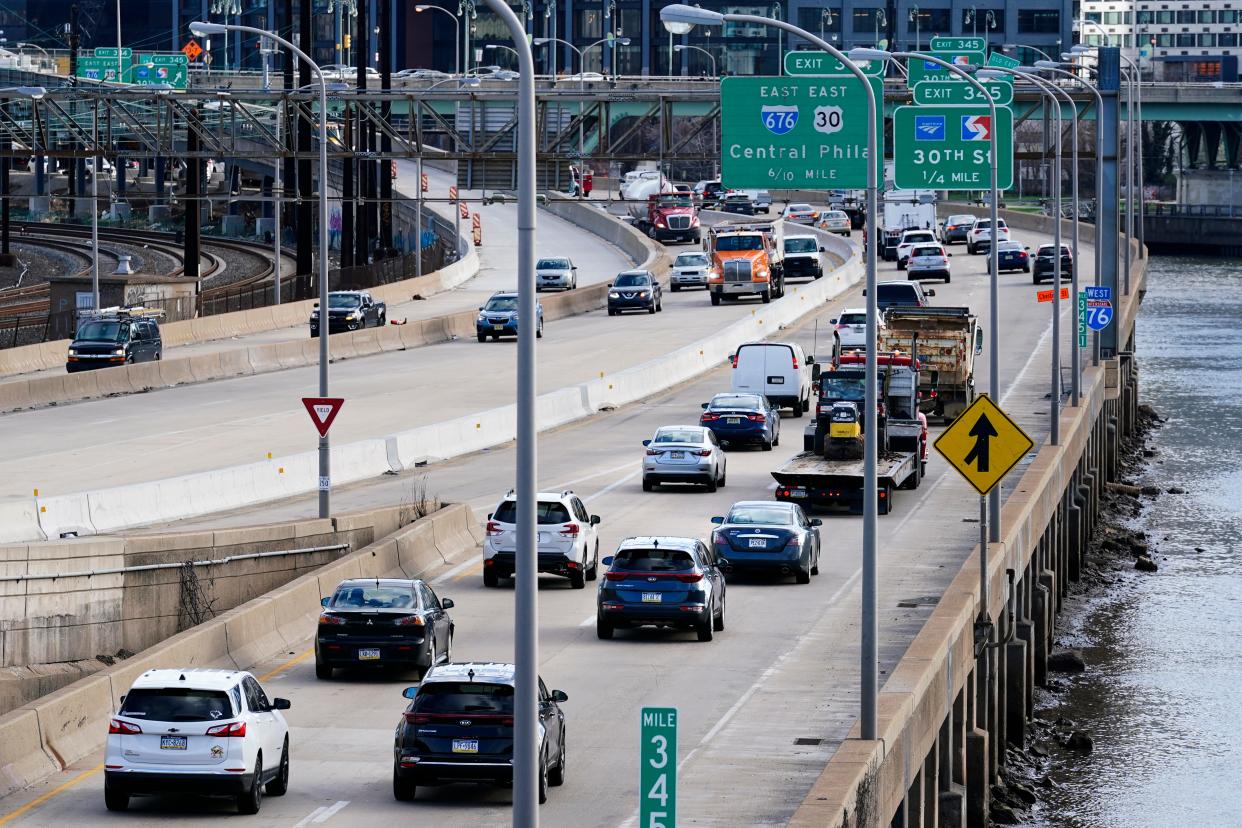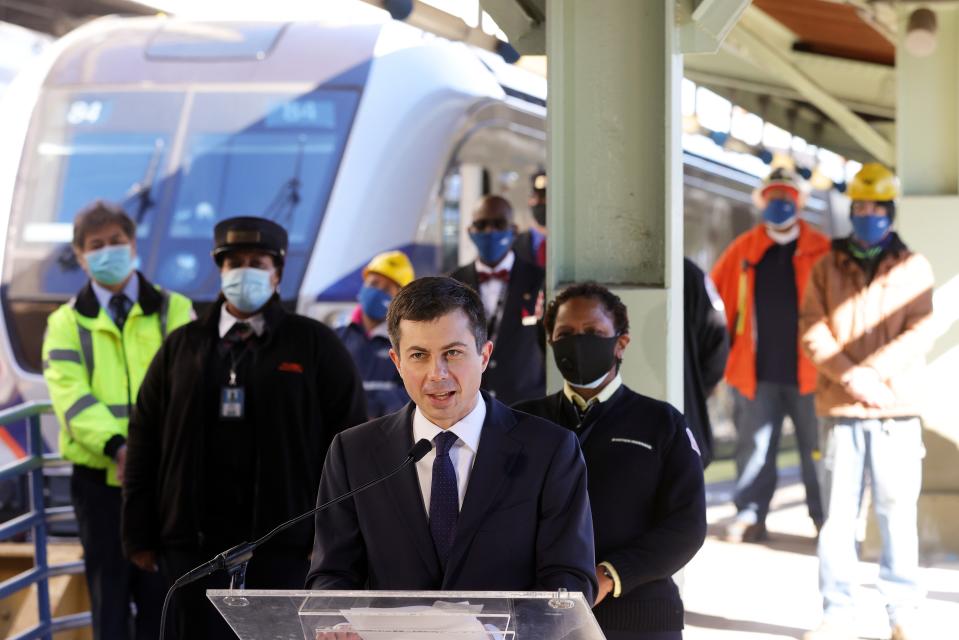A gas tax? A mileage tax? Biden wary of user fees to pay for roads, bridges and highways

- Oops!Something went wrong.Please try again later.
- Oops!Something went wrong.Please try again later.
WASHINGTON – As President Joe Biden prepares to reveal his infrastructure package on Wednesday, he could run into the same potential roadblock faced by his predecessor: how to pay for it.
The proposal he's scheduled to roll out in Pittsburgh will include offsets, according to the White House.
Officials haven't said what they will be. But they've suggested the funding mechanisms are focused on higher taxes for the wealthy or corporations rather than increased user fees, the primary source of funding for the nation’s roads and bridges.
"He’s going to have a plan to pay for it," White House press secretary Jen Psaki said on Monday. "He also believes that we have an opportunity to rebalance, to address our tax code that is out of date, and some could pay more in our country that are not currently."
Putting aside whether increases in income or corporate taxes could get through the narrowly divided Senate, it would be a further shift away from a "user pays" model for highways that started in the 1950s.
Fuel taxes have provided 85% to 90% of the money in the Highway Trust Fund in most years, according to the nonpartisan Congressional Research Service. But since 2008, Congress has transferred $157 billion from the general treasury to the Highway Trust Fund to cover the shortfall for authorized programs, according to the Congressional Budget Office.
After Pete Buttigieg said at his January confirmation hearing for transportation secretary that he was open to all funding options, his spokesman quickly clarified that those options did not include a gas tax increase.
Last week, Buttigieg acknowledged the "difficulty in Washington" in raising the gas tax and said other options are needed "if we want to preserve that user-pays principle."
He told CNBC on Friday that a vehicle-miles-traveled tax "shows a lot of promise" as a sustainable funding stream.
But it's not promising enough for Biden's plan.
"The Secretary was having a broad conversation about a variety of ways to fund transportation," spokesman Benjamin Halle said in a statement. "To be clear, he never said that VMT was under consideration by the White House as part of this infrastructure plan – and it is not."
Buttigieg delivered the same message on CNN Monday.
"That's not part of the conversation about this infrastructure bill," he said. "Just want to make sure that's really clear."
Both a new mileage tax or an increase in the existing gas tax would bump up against Biden’s pledge not to raise taxes on people making less than $400,000.
Republicans: Biden's infrastructure bill should focus on roads, rail, ports - not climate or social justice
Longtime problem

The lack of sustainable funding has thwarted highway bills for decades.
Congress approved the last five-year funding bill in December 2015 with a variety of onetime funding mechanisms rather than a long-term solution like raising the gas tax.
“We’ve been playing a game of financial gymnastics by taking more money from the general fund – wad up the chewing gum and the duct tape and plug the holes,” said Joseph Kane, senior research associate at the Brookings Institution’s Metropolitan Policy Program.
And still, the Congressional Budget Office has projected a nearly $70 billion shortfall in the Highway Trust Fund in the next five years.
The problem is that the gas tax, which is the primary contributor to the Highway Trust Fund, isn't indexed for inflation and hasn’t kept pace with construction needs as cars became more fuel-efficient. Congress set the taxes of 18.4 cents a gallon for gasoline and 24.3 cents a gallon for diesel fuel in 1993.
In 2018, the U.S. Chamber of Commerce proposed phasing in a 25-cent-a-gallon increase in the gas tax over five years to generate nearly $400 billion over a decade.
But that wasn't enough political pressure – or cover – for Congress or President Donald Trump to embrace the idea. Trump's long-promised "infrastructure week" became a running punch line.
Trump's infrastructure plan
In 2018, Trump proposed moving over $200 billion from other federal programs, as well as shifting some of the financial burden onto states and local governments and to private groups. Under that plan, which went nowhere, the federal government would have paid for 10% to 20% of a highway's cost instead of the usual 80%.
The U.S. Chamber of Commerce continues to argue that user fees are the way to pay for the nation's deteriorating roads, bridges, transit and water systems.
Neil Bradley, executive vice president and chief policy officer at the business group, notes that state-level lawmakers from both parties have raised gas taxes even as Washington refused.
“It is absolutely hindering American competitiveness and economic growth,” Bradley said. “Washington has failed to keep up its portion of the deal.”
Jeff Davis, a senior fellow at the Eno Center for Transportation, suggested that if the government isn’t willing to increase taxes on highway users, it should reduce spending from the Highway Trust Fund to about $39 billion a year for highways and $5 billion for transit that the current taxes generate. This would be a decline of about $10 billion a year for highways and $5 billion for transit – from spending levels that transportation advocates argue already falls short of needs.
“But it has been proven easier for the powers that be to just keep funneling general fund money through the Trust Fund instead of on top of it,” Davis said.
Infrastructure: Unsafe roads, bridges, railways across the US, conditions by state
Kane said the infrastructure debate must deal with complications in transportation, in addition to complications in funding. More electric vehicles to address climate change goals would require more charging stations. Encouraging more train travel would require investment in rails.
“It’s not one silver-bullet solution,” said Kane, who called the gas tax a “cartoonish” solution to myriad transportation problems. “It doesn’t begin to address the complexity of our transportation needs.”
More: Coronavirus cuts transportation funding, puts major road and bridge projects on hold
Testing a mileage tax
Oregon is experimenting with a vehicle mileage tax, but the system would require a massive new bureaucracy at the federal level.
Rep. Sam Graves of Missouri, top Republican on the House Transportation and Infrastructure Committee, told Buttigieg at a hearing last week that he supported creating a vehicle mileage tax to replace the federal gas tax. He has proposed testing a mileage tax on the U.S. Postal Service, with a large fleet of vehicles in urban and rural settings.
“As a conservative, I strongly believe in the user-pays principle, and I believe that we need to start ensuring that all users pay their fair share for the roads they’re using," Graves said.
But Rep. Doug LaMalfa, R-Calif., told Buttigieg that truckers and small businesses in his rural district would be hit hard by a vehicle mileage tax replacing the gas tax.
More: Biden faces tough balancing act on infrastructure as pressure builds on immigration, gun control
Bradley of the U.S. Chamber of Commerce, which supports a vehicle mileage tax to deal with electric vehicles, said the key in Congress will be to negotiate a bipartisan package.
“In private conversations with lawmakers from both parties, you get an acknowledgement that increasing the user fees – the gas tax, implementing the VMT as an independent board – makes a lot of sense,” Bradley said. “They will also say they are very afraid of doing it without it being bipartisan, meaning that one party takes the blame."
Sen. John Kennedy, R-La., complained Sunday that Biden is looking at paying for infrastructure through income tax increases.
"He is going to raise taxes dramatically," Kennedy said on Fox News. "He's going to make tax policy on the basis of class warfare."
Psaki said Monday that if lawmakers don't like the funding mechanisms that Biden proposes, they can suggest their own ideas.
"If they share a goal of building our infrastructure for the future," she said, " we’re happy to look at their proposals.”
This article originally appeared on USA TODAY: Infrastructure plan: Biden rejects gas tax, mileage fee to pay for it

